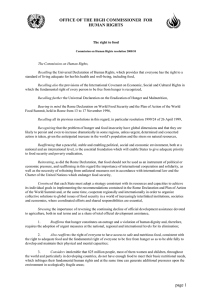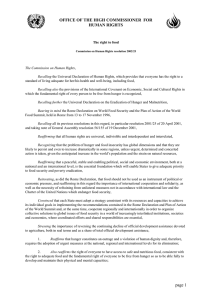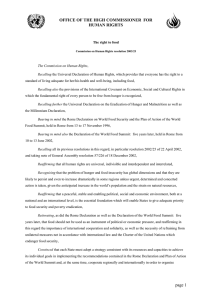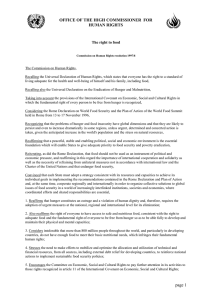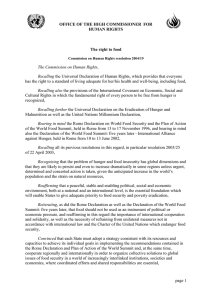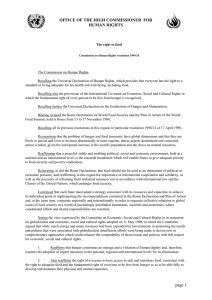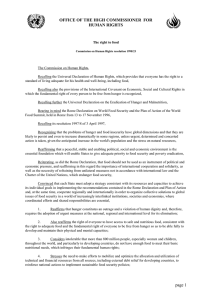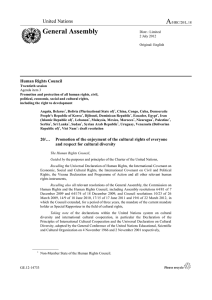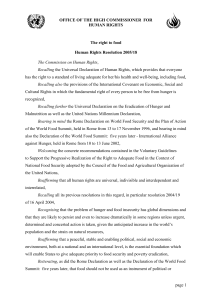OFFICE OF THE HIGH COMMISSIONER FOR HUMAN RIGHTS
advertisement
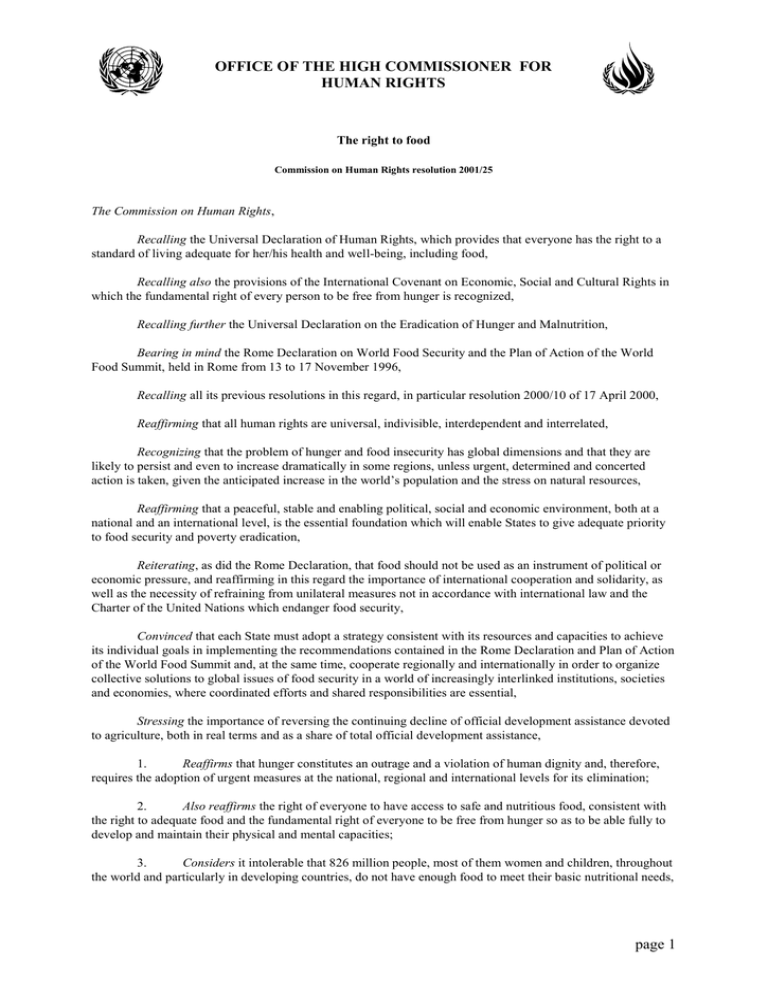
OFFICE OF THE HIGH COMMISSIONER FOR HUMAN RIGHTS The right to food Commission on Human Rights resolution 2001/25 The Commission on Human Rights, Recalling the Universal Declaration of Human Rights, which provides that everyone has the right to a standard of living adequate for her/his health and well-being, including food, Recalling also the provisions of the International Covenant on Economic, Social and Cultural Rights in which the fundamental right of every person to be free from hunger is recognized, Recalling further the Universal Declaration on the Eradication of Hunger and Malnutrition, Bearing in mind the Rome Declaration on World Food Security and the Plan of Action of the World Food Summit, held in Rome from 13 to 17 November 1996, Recalling all its previous resolutions in this regard, in particular resolution 2000/10 of 17 April 2000, Reaffirming that all human rights are universal, indivisible, interdependent and interrelated, Recognizing that the problem of hunger and food insecurity has global dimensions and that they are likely to persist and even to increase dramatically in some regions, unless urgent, determined and concerted action is taken, given the anticipated increase in the world’s population and the stress on natural resources, Reaffirming that a peaceful, stable and enabling political, social and economic environment, both at a national and an international level, is the essential foundation which will enable States to give adequate priority to food security and poverty eradication, Reiterating, as did the Rome Declaration, that food should not be used as an instrument of political or economic pressure, and reaffirming in this regard the importance of international cooperation and solidarity, as well as the necessity of refraining from unilateral measures not in accordance with international law and the Charter of the United Nations which endanger food security, Convinced that each State must adopt a strategy consistent with its resources and capacities to achieve its individual goals in implementing the recommendations contained in the Rome Declaration and Plan of Action of the World Food Summit and, at the same time, cooperate regionally and internationally in order to organize collective solutions to global issues of food security in a world of increasingly interlinked institutions, societies and economies, where coordinated efforts and shared responsibilities are essential, Stressing the importance of reversing the continuing decline of official development assistance devoted to agriculture, both in real terms and as a share of total official development assistance, 1. Reaffirms that hunger constitutes an outrage and a violation of human dignity and, therefore, requires the adoption of urgent measures at the national, regional and international levels for its elimination; 2. Also reaffirms the right of everyone to have access to safe and nutritious food, consistent with the right to adequate food and the fundamental right of everyone to be free from hunger so as to be able fully to develop and maintain their physical and mental capacities; 3. Considers it intolerable that 826 million people, most of them women and children, throughout the world and particularly in developing countries, do not have enough food to meet their basic nutritional needs, page 1 which infringes their fundamental human rights and at the same time can generate additional pressures upon the environment in ecologically fragile areas; 4. Stresses the need to make efforts to mobilize and optimize the allocation and utilization of technical and financial resources from all sources, including external debt relief for developing countries, to reinforce national actions to implement sustainable food security policies; 5. Encourages all States to take steps with a view to achieving progressively the full realization of the right to food, including steps to promote the conditions for everyone to be free from hunger and as soon as possible enjoy fully the right to food, as well as to elaborate and adopt national plans to combat hunger; 6. Takes note of The State of the World’s Children 2001 report on early childhood of the United Nations Children’s Fund and, in this context, recalls that the nurturing of young children merits the highest priority; 7. Takes note with appreciation of the report of the Special Rapporteur on the right to food, submitted in accordance with Commission resolution 2000/10 (E/CN.4/2001/53), and commends the Special Rapporteur for his valuable work in the promotion of the right to food; 8. Requests the Special Rapporteur, in the fulfilment of his mandate, to continue to carry out the following main activities: (a) To seek, receive and respond to information on all aspects of the realization of the right to food, including the urgent necessity of eradicating hunger; (b) To establish cooperation with Governments, intergovernmental organizations, in particular the Food and Agriculture Organization of the United Nations, and non-governmental organizations on the promotion and effective implementation of the right to food and to make appropriate recommendations on the realization thereof, taking into consideration the work already done in this field throughout the United Nations system; (c) To identify emerging issues related to the right to food worldwide; 9. Also requests the Special Rapporteur, in discharging his mandate, to pay attention to the issue of drinking water, taking into account the interdependence of this issue and the right to food; 10. Further requests the Special Rapporteur to contribute effectively to the medium-term review of the implementation of the Rome Declaration on World Food Security and the Plan of Action of the World Food Summit by submitting to the United Nations High Commissioner for Human Rights his recommendations on all aspects of the right to food; 11. Encourages the Special Rapporteur to mainstream a gender perspective in the activities relating to his mandate; 12. Requests the High Commissioner to provide all the necessary human and financial resources for the effective fulfilment of the mandate of the Special Rapporteur; 13. Welcomes the work already done by the Committee on Economic, Social and Cultural Rights in promoting the right to adequate food, in particular its General Comment No. 12 (1999) on the right to adequate food (art. 11 of the International Covenant on Economic, Social and Cultural Rights), in which the Committee affirmed, inter alia, that the right to adequate food is indivisibly linked to the inherent dignity of the human person and is indispensable for the fulfilment of other human rights enshrined in the International Bill of Human Rights and is also inseparable from social justice, requiring the adoption of appropriate economic, environmental and social policies, at both the national and international levels, oriented to the eradication of poverty and the fulfilment of all human rights for all; 14. Also welcomes the convening by the High Commissioner in Bonn, from 12 to 14 March 2001, of the Third Expert Consultation on the Right to Food, with a focus on implementation mechanisms at country page 2 level, hosted by the Government of Germany, and takes note with interest of the report of the Third Expert Consultation (E/CN.4/2001/148); 15. Recommends that the High Commissioner organize a fourth expert consultation on the right to food, with a focus on the realization of this right as part of strategies and policies for the eradication of poverty, inviting experts from all regions; 16. Requests the Special Rapporteur to submit a preliminary report to the General Assembly at its fifty-sixth session and a final report on the implementation of the present resolution to the Commission at its fifty-eighth session; 17. Invites Governments, relevant United Nations agencies, funds and programmes, treaty bodies and non-governmental organizations, to cooperate fully with the Special Rapporteur in the fulfilment of his mandate, inter alia through the submission of comments and suggestions on ways and means of realizing the right to food. 70th meeting 20 April 2001 [Adopted by a roll-call vote of 52 votes to 1. .] page 3
